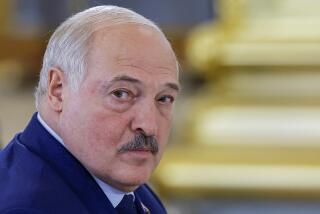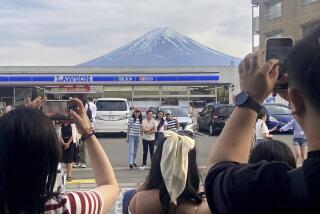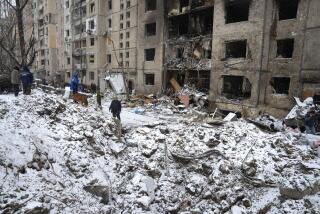Russian City to Ban ‘Outsiders’
- Share via
MOSCOW — Norilsk, the city of nickel, situated above the Arctic Circle in Russia’s freezing, inhospitable north, has been declared off limits to foreigners.
Set in a barren landscape of dead trees, home to the world’s biggest nickel mine and known for industrial pollution so severe it has drifted as far as arctic Canada, Norilsk is not exactly Paris.
Yet foreigners, local authorities complain, are flooding the city, bringing crime, AIDS and drugs. So beginning Nov. 25, the local airline, KrasAir, will restrict ticket sales to Norilsk, and would-be visitors will have to get special permission and an invitation.
Norilsk’s closure is unusual because authorities are not citing military secrecy as the motive, but simply the desire to keep the city free of outsiders.
In Soviet times, many cities and towns were closed to foreigners, usually because they were home to nuclear, biological or chemical weapons production, plutonium enrichment, space research or military intelligence.
When the Soviet Union collapsed a decade ago, most of those cities remained off limits. In July the Russian government formalized the Soviet-era restrictions, publishing a list of 90 cities, towns and villages still closed to outsiders for security reasons.
Norilsk, population 230,000, is home to the giant Norilsk Nickel firm and other industrial plants but was never listed among the closed Soviet cities.
When Krasnoyarsk Gov. Alexander I. Lebed, whose domain includes Norilsk, pledged Thursday to “cleanse” the city of foreigners, he was using a code word every Russian understands.
To Russians, it was clear that the restriction was aimed not at Americans, French or Germans but at people from what is known as the “near abroad,” or former Soviet states, particularly southern republics such as Azerbaijan.
“The decree does impose entry restrictions for foreigners. But you must understand that people from other republics of CIS [Commonwealth of Independent States, which includes most former Soviet republics] are also foreigners, and this is a very important factor needed to understand these measures fully,” said Gennady Likhovtsev, a government security official in the region.
“The reason for it is the crime and drug situation in the city. I mean such crimes as theft of precious metals from local enterprises,” he said.
Lebed said tough measures would be taken against any foreigner who comes to the city after the restriction takes effect.
Non-Russians without invitations will be deported, he said. Only citizens from Belarus, which is bound in a loose union with Russia, will be exempt.
“It will not be easy because a person can simply say that he has no money and no place to live. But we will clean Norilsk anyway,” said Lebed, whose vast Krasnoyarsk region stretches from far northern Russia almost to its southern border.
Hostility in Russia toward the dark-skinned people of southern republics appears to have become more brazen lately. In Moscow last week, a large band of skinheads went on a rampage, beating up people of Caucasian appearance and killing two, an Indian and an Armenian. In April, more than 100 youths clashed with market traders of Caucasian origin in the capital. Many smaller attacks go unreported.
An official of the Krasnoyarsk region, Gennady Klimik, blamed crime in Norilsk on the Azeri population and said local residents want fewer of them around.
“Norilsk is a very rich and stable city that attracts not only big-business people dealing with Norilsk Nickel but other foreigners trying to earn money in any way,” he told the Reuters news agency, adding that 23,000 Azeris live in Norilsk. He said 4,500 foreigners came to Norilsk in the first 10 months of the year.
Norilsk Mayor Oleg Budarin said in an interview on Russian television that foreigners who want to visit Norilsk must have invitations from companies or organizations, which must report the visit to the FSB, the main successor to the KGB.
More to Read
Sign up for Essential California
The most important California stories and recommendations in your inbox every morning.
You may occasionally receive promotional content from the Los Angeles Times.













